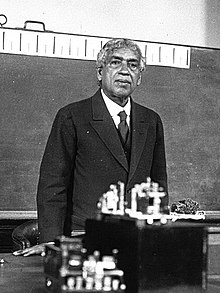Sir Jagadish Chandra Bose
The Father of the Radio Science.

About Acharya Sir Jagadish Chandra Bose :
- Sir Bose was born in 1858, Bikrampur, Bengal Presidency, British India(Now Munsiganj, Bangladesh).
- Sir Bose was a biologist, physicist, botanist and an early writer of science fiction.
- He went to the University of London, England to study medicine, but could not pursue studies in medicine because of health problems. Instead, he conducted his research with the Nobel Laureate Lord Rayleigh at Cambridge and returned to India. He joined the Presidency College of the University of Calcutta as a professor of physics. There, despite racial discrimination and a lack of funding and equipment, Bose carried on his scientific research. He made remarkable progress in his research of remote wireless signalling and was the first to use semiconductor junctions to detect radio signals. However, instead of trying to gain commercial benefit from this invention, Bose made his inventions public in order to allow others to further develop his research.
- He founded Bose Institute, a premier research institute of India and also one of its oldest.Established in 1917, the Institute was the first interdisciplinary research centre in Asia.He served as the Director of Bose Institute from its inception until his death.
- Bose subsequently made a number of pioneering discoveries in plant physiology. He used his own invention, the crescograph, to measure plant response to various stimuli, and thereby scientifically proved parallelism between animal and plant tissues. Although Bose filed for a patent for one of his inventions because of peer pressure, his objection to any form of patenting was well known. To facilitate his research, he constructed automatic recorders capable of registering extremely slight movements; these instruments produced some striking results, such as quivering of injured plants, which Bose interpreted as a power of feeling in plants. His books include Response in the Living and Non-Living (1902) and The Nervous Mechanism of Plants (1926). In a 2004 BBC poll, Bose was voted seventh Greatest Bengali of all time.
- He pioneered the investigation of radio and microwave optics, made significant contributions to plant science, and laid the foundations of experimental science in the Indian subcontinent.
- One of the important influences on Bose was Sister Nivedita who supported him by organizing financial support and editing his manuscripts; she made sure that Bose was able to continue with and share his work.
- IEEE named him one of the fathers of radio science.Bose is considered the father of Bengali science fiction, and also invented the crescograph, a device for measuring the growth of plants.
- A crater on the moon has been named in his honour.
"I dedicate today this Institute—not merely a Laboratory but a Temple. The power of physical methods applies to the establishment of that truth which can be realised directly through our senses, or through the vast expansion of the perceptive range by means of artificially created organs... Thirty-two years ago I chose the teaching of science as my vocation. It was held that by its very peculiar constitution, the Indian mind would always turn away from the study of Nature to metaphysical speculations. Even had the capacity for inquiry and accurate observation been assumed to be present, there were no opportunities for their employment ; there were neither well-equipped laboratories nor skilled mechanicians. This was all too true. It is not for man to complain of circumstances, but bravely to accept, to confront and to dominate them ; and we belong to that race which has accomplished great things with simple means....."
--Acharya Sir Jagadish Chandra Bose